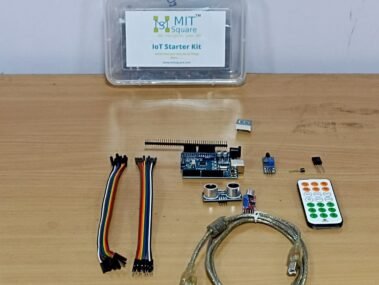SRM Institute of Science and Technology Ramapuram Campus, Chennai,
Department of CSE
Centre of Excellence for Internet of Things
Powered by
MIT Square, London
An ISO 9001:2015 International Certified Company
About SRM ,Ramapuram
SRM IST Ramapuram is one of the Top Ranking University in India with over 20,000 students and 1,500 faculty, offering a wide range of undergraduate, postgraduate, and doctoral programs in Engineering, Management, Medicine and Health Sciences, Science, and Humanities.
About MIT Square Services Private Limited
MIT Square™ is an ISO Certified Company headquartered at the center of India’s high-tech industry, Bangalore, which is “Silicon Valley of India”. The company is a registered MSME recognised by the Ministry of MSME, Govt. of India. The company also has a registered office at the centre of UK’s IT Hub, London, which is “Silicon Valley of UK”. The company is recognised by the Ministry of Corporate Affairs, Govt. of UK. The other network offices are in the USA, Australia and Singapore. MIT stands for “Management and Innovation for Transformation” and Square represents “People + Process + Product + Profit” with a tagline “We transform your life”. Our core technical team is from IITs and Universities in London.
MIT Square™ is a globally trusted brand that believes in transforming the lives of people by synchronizing the fragmented business eco-system with their growing essential necessities for a better wellbeing in the area of EduTech, HealthTech, AgroTech, and GreenTech. We support in incubation/start-up, business operations, talent enablement (training & learning), talent acquisition, innovations, patent filing, product design & development, manufacturing and supply of various technological and non-technological products.
As of Jan 2020, India’s ecosystem has been very exciting when it comes to innovations – its success in filing patents and deploying products in the market. We are part of building ‘New India’ and addressing ‘Gig Economy’. With the Government’s initiative of ‘Digital India’, ‘Make in India’, `Startup India’, `Standup India’, `Skill India’ and ‘Self-reliant India’ gaining momentum, the trend is supposed to be upwards for many years to come. India turning into a “Manufacturing Hub” with a “Make for World” model, we are passionate and committed in making your dream a reality by providing various services and products within India and Abroad.
Centre of Excellence for Internet of Things
The Centre of Excellence (CoE) for Internet of Things (IoT) at Department of Computer Science and Engineering, SRM Institute of Science and Technology, Ramapuram Campus has been established in January 2022 powered by MIT Square, London through the Memorandum of Understanding. The vision of the CoE is to enable the department as an innovation hub in the emerging technology of Internet of Things through democratization of Innovation, Standardization, Realization of prototype, products before deployment of the IoT devices in the public domain/ infrastructure and support Govt. initiatives on IoT solutions for specific India needs in areas like water, energy, agriculture, health, security and privacy of data.
Key Initiatives (i-10 Model):
- Innovation & Research
- Ideas to Prototypes & Products
- Inductive Programs
- Internships & Talent Transformation
- International Publications
- I-Centric Events
- IP Rights & Protection
- Intrapreneurship & Entrepreneurship
- Institution & Industry Connects
- Incubation, Investments & Fundings
Detailed Objectives:
The Centre of Excellence in Internet of Things (IoT) highlights the growth & development of tech-driven solutions for achieving the digital transformation and enables the institute to:
- To create innovative applications and domain capability across verticals for country’s needs such as Smart City, Smart Health, Smart Manufacturing, Smart Agriculture, etc.
- To build industry capable talent, start-up community and entrepreneurial ecosystem for IoT.
- To provide an ecosystem for innovation to thrive and embrace entrepreneurship.
- To energize research mind-set and reduce costs in research and development by providing neutral and interoperable, multi-technology stack laboratory facilities.
- To reduce import dependency on IoT components and promote indignation.
- To position the institution as a provider of end-to-end solution in engineering space.
- To provide training and learning (including internships) both online and offline. Gives a hands-on experience to students, faculties and research scholars with the world class equipment’s, Software and Tools.
- To provide environment for product creation, testing and also for validation & incubation.
- Gives learning opportunities of breakthrough technologies like AR/VR, Data Analytics & AI for students, faculties and research scholars.
- Give impetus to research, technology development, product development, technology incubation and entrepreneurship in Virtual & Augmented Reality and allied fields.
- Develop application platforms for specific skill development programs based on the industry needs and relevance.
- Produce new generation of entrepreneurs and incubates, who are ready to reap the benefits of the incubation and start-up facilities.
- To create a core group of researchers in the area of IoT, Embedded Systems, AI and AR/VR.
Also, the institution can also function as an IoT “Nodal” centre with the following benefits:
- A fully IoT Techno-Entrepreneurship Innovation lab with Hardware and software tools with licenses can be utilized for development and research projects.
- Recognition of being one of the top National Academies for IoT and Embedded Systems innovation lab.
- Essential curriculum and resource kits to provide comprehensive training, and industry readiness for students and support to apply for research funds.
- Scalable infrastructure to extend training to corporates and professionals from other industries.
- Up to 10 years assured training support from MIT Square that will help empower your faculty, reach scholars and students in IoT and Embedded solutioning across verticals.
- Based on the latest NEP 2020, we will be supporting in the regional languages as well.
The future of IoT and Industry 4.0:
Internet of Things (IoT) technology has transformed almost every industry sector, including but not limited to energy, healthcare, transportation, manufacturing, retail, and agriculture. This evolution has opened up an era of innovation and economic growth that is surpassed by none, in recent times. The setting up of the IoT lab would empower a new generation of engineers equipped with skills essential and relevant to the technical workforce. The students will have the access to the lab equipment, study material, hardware & software to build IoT applications and other advanced embedded systems based projects.
The future of IoT has the potential to be limitless. Advances to the industrial internet will be accelerated through increased network agility, integrated artificial intelligence (AI) and the capacity to deploy, automate, orchestrate and secure diverse use cases at hyperscale. The potential is not just in enabling billions of devices simultaneously but leveraging the huge volumes of actionable data which can automate diverse business processes. As networks and IoT platforms evolve to overcome these challenges, through increased capacity and AI, service providers will edge furthermore into IT and web scale markets – opening entire new streams of revenue.
An exciting wave of future IoT applications will emerge, brought to life through intuitive human to machine interactivity. Human 4.0 will allow humans to interact in real time over great distances – both with each other and with machines – and have similar sensory experiences to those that they experience locally. This will enable new opportunities within remote learning, surgery and repair. Immersive mixed reality applications have the potential to become the next platform after mobile – realized through 3D audio and haptic sensations and becoming our main interface to the real world. Bringing future IoT to life will require close synergy between the IoT- and network platforms.
10 predictions about the future of IoT:
- By 2025, it is estimated that there will be more than to 21 billion IoT devices
A quick look back shows where IoT devices are going. Consider: In 2016, there were more than 4.7 billion things connected to the internet, according to IOT Analytics. Fast-forward to 2021? The market will increase to nearly 11.6 billion IoT devices.
- Cybercriminals will continue to use IoT devices to facilitate DDoS attacks
In 2016, the world was introduced to the first “Internet of Things” malware — a strain of malicious software that can infect connected devices such as DVRs, security cameras, and more. The Mirai malware accessed the devices using default password and usernames.
What happened next? The malware turned the affected devices into a botnet to facilitate a Distributed Denial of Service (DDoS) attack, which aims to overwhelm websites with internet traffic. The attack ended up flooding one of the largest website hosting companies in the world, bringing a variety of major, well-known websites and services to a halt for hours. This particular strain of malware is called “open source,” which means the code is available for anyone to modify.
- More cities will become “smart”
Consumers won’t be the only ones using IoT devices. Cities and companies will increasingly adopt smart technologies to save time and money. That means cities will be able to automate, remotely manage, and collect data through things like visitor kiosks, video camera surveillance systems, bike rental stations, and taxis.
- Artificial intelligence will continue to become a bigger thing
Smart home hubs, thermostats, lighting systems, and even coffee makers collect data on your habits and patterns of usage. When you set up voice-controlled devices, you allow them to record what you say to them and store those recordings in the cloud. In most cases, the data is collected to help facilitate what is called machine learning.
Machine learning is a type of artificial intelligence that helps computers “learn” without someone having to program them. The computers are programmed in a way that focuses on data that they receive. This new data can then help the machine “learn” what your preferences are and adjust itself accordingly. For instance, when a video website suggests a movie you might like, it’s likely learned your preferences based on your past choices.
- Routers will continue to become more secure and smarter
Because most consumer IoT devices reside in the home and can’t have security software installed on them, they can be vulnerable to attacks. Why? A lot of manufacturers work to get their IoT products to market quickly, so security may be an afterthought. This is where the home router plays a very important role. The router is essentially the entry point of the internet into your home.
While many of your connected devices cannot be protected, the router has the ability to provide protection at the entry point. A conventional router provides some security, such as password protection, firewalls, and the ability to configure them to only allow certain devices on your network. Router makers will likely continue to seek new ways to boost security.
- 5G Networks will continue to fuel IoT growth
Major wireless carriers will continue to roll out 5G networks. 5G — fifth-generation cellular wireless — promises greater speed and the ability connect more smart devices at the same time.
Faster networks mean the data accumulated by your smart devices will be gathered, analyzed and managed to a higher degree. That will fuel innovation at companies that make IoT devices and boost consumer demand for new products.
- Cars will get even greener and smarter
The arrival of 5G will shift the auto industry into a higher gear. The development of driverless cars — as well as the connected vehicles already on the road — will benefit from data moving faster.
You might not think of your car as an Internet of Things device. But new cars will increasingly analyse your data and connect with other IoT devices — including other high-tech vehicles on four wheels. The fuel-based vehicles will be turned into electric vehicles.
- 5G’s arrival will also open the door to new privacy and security concerns
In time, more 5G IoT devices will connect directly to the 5G network than via a Wi-Fi router. This trend will make those devices more vulnerable to direct attack. For home users, it will become more difficult to monitor all IoT devices, because they will bypass a central router. On a broader scale, the increased reliance on cloud-based storage will give attackers new targets to attempt to breach.
- IoT-based DDoS attacks will take on more dangerous forms
Botnet-powered distributed denial of service (DDoS) attacks have used infected IoT devices to bring down websites. IoT devices can be used to direct other attacks.
For instance, there may be future attempts to weaponize IoT devices. A possible example would be a nation shutting down home thermostats in an enemy state during a harsh winter.
- Security and privacy concerns will drive legislation and regulatory activity
The increase in IoT devices is just one reason security and privacy concerns are rising. In mid-2018, the European Union implemented the General Data Protection Regulation. GDPR has led to similar security and privacy initiatives in several nations around the world. In the United States, California recently passed a tougher privacy law. What does this mean for you? Such efforts could give you more control over your data.
CoE Inauguration by Mr.S.Niranjan,Co-Chairman on 27.01.2022
Mr. S . Niranjan, Co-Chairman ,Dr . V. Subbiah Bharathi,Director and Dr.M.Murali Krishna,Dean (E & T) discussing about the IoT projects with second year students
IoT components received from MIT Square, London










